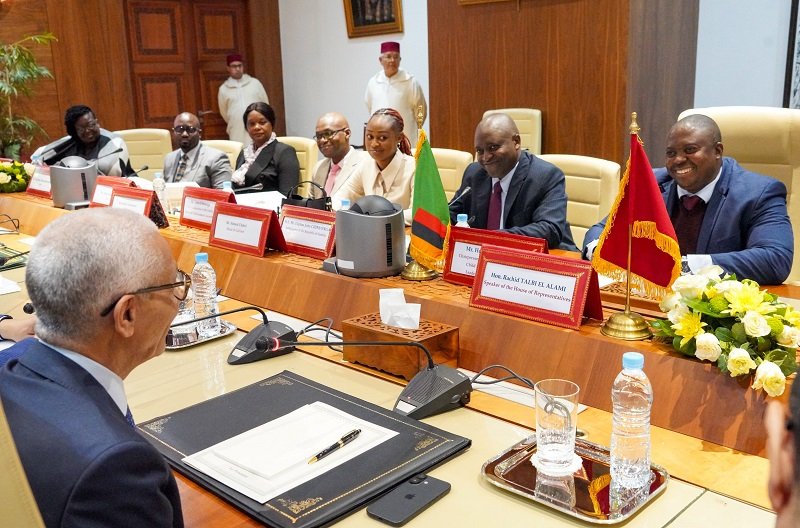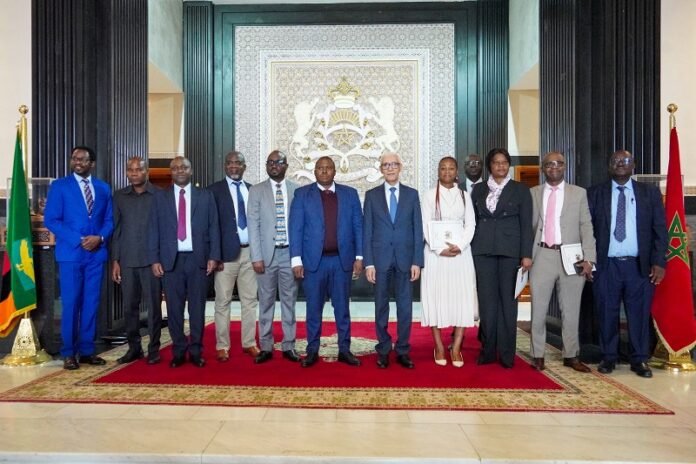On Monday, April 14, 2025, the President of the Moroccan House of Representatives, Rachid Talbi Alami, met with the President of the Youth, Sports, and Child Affairs Committee of the National Assembly of the Republic of Zambia, Mr. Heartson Mabeta.
The meeting, held at the Parliament headquarters in Rabat, took place as part of the working visit by the Zambian parliamentary delegation. The goal of this visit is to strengthen cooperation between the two countries in various sectors, including sports and youth.

But what can such parliamentary meetings really achieve? Do they represent a significant turning point in Morocco-Zambia relations, or are they just a symbolic step in a relationship that still needs real momentum?
First Aspect: The Dimensions of Bilateral Relations Between the Two Countries
Zambia, like many other African countries, seeks to enhance its cooperation with the Kingdom of Morocco, especially in the fields of sports and other sectors. The recent visit highlighted the evolution of bilateral relations, particularly after Morocco’s opening up to the African continent in recent years.
But are parliamentary visits sufficient to strengthen this cooperation in the long term? What role can the Moroccan Parliament play in supporting this partnership?
Second Aspect: The Absence of Ministers, Does It Reflect Weak Coordination?
A simple observation reveals that the Moroccan Ministers of Youth and Sports were absent from the meeting, which raises several questions. Does this absence indicate a lack of coordination among Morocco’s government authorities? Wouldn’t it have been more appropriate for this meeting to include these ministers to give it greater weight and impact?
Third Aspect: The Importance of Parliamentary Role in International Relations
While the role of Parliament in strengthening international relations may sometimes seem counterintuitive, it is undeniable that Parliament can play a crucial role in developing relations between nations. Through parliamentary dialogue, common issues such as sports, education, and child protection can be highlighted, and these topics are essential for promoting cooperation between countries.
Fourth Aspect: Sports and Parliamentary Cooperation
In his remarks, the President of the Youth, Sports, and Child Affairs Committee of Zambia expressed admiration for Morocco’s progress in sports, especially in football, after the Moroccan national team reached the semifinals of the 2022 World Cup in Qatar. But is this appreciation enough to establish a true partnership? What can this visit bring in terms of sports cooperation, and how can the Moroccan Parliament benefit from Zambia’s experience?
Fifth Aspect: Interdependence of Various Sectors
The intervention of the President of the Moroccan House of Representatives regarding Morocco’s development policy in Africa and its openness toward a continent rich in resources requires a deeper analysis. Is this policy part of a long-term vision for Morocco-Africa relations? And how can sectors such as education, employment, and social protection serve as levers to strengthen relations between the two countries?
Conclusion:
While many questions remain regarding the deepening of cooperation between Morocco and Zambia, yesterday’s meeting represents the first step in a process that could eventually lead to a stronger strategic partnership. But will this visit evolve into a sustainable cooperation? Only time will tell.
Questions Needing Clarification:
-
Why were the Moroccan Ministers of Youth and Sports absent from this meeting? Does this reflect a lack of coordination between Moroccan authorities?
-
How can the Moroccan Parliament play a key role in expanding the partnership between the two countries?
-
What real impact could this visit have on bilateral relations in the long term?
-
Is the partnership between the two countries solely related to the sports sector, or can it extend to other areas like education and social protection?




